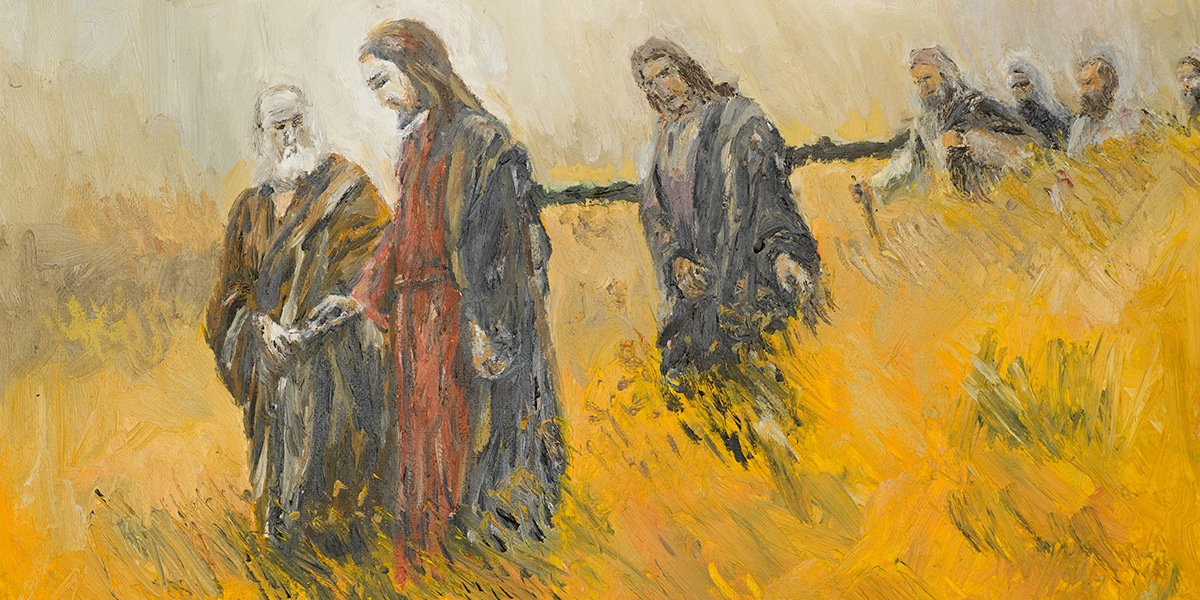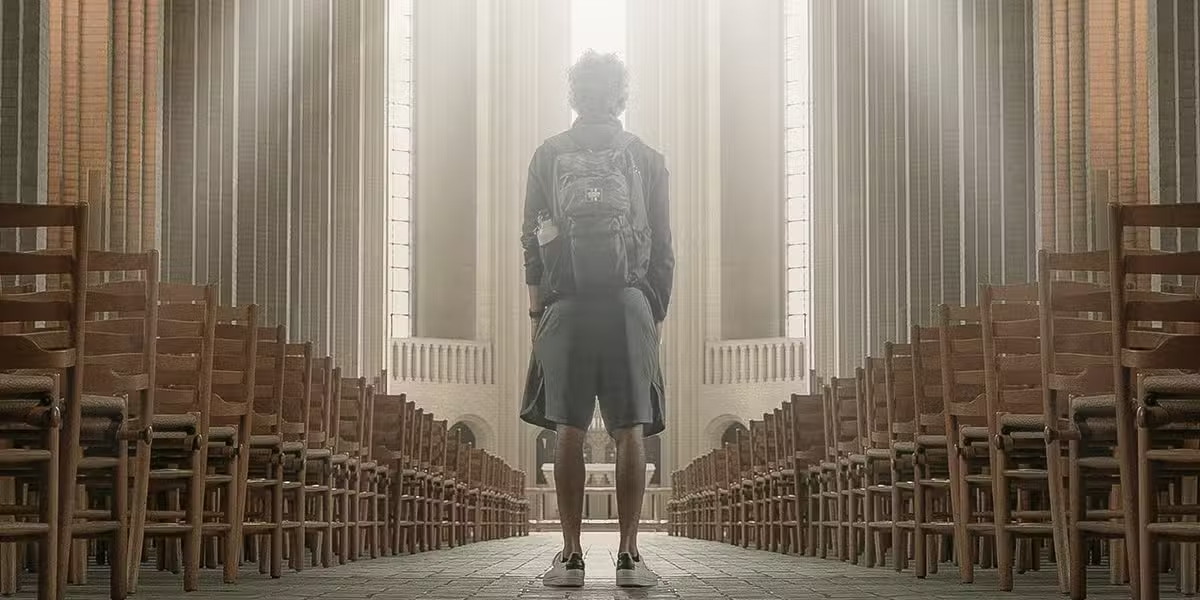Jesus set the example for addressing stress and fear.
There are times when the most loving, spiritual person can feel as if there’s nothing left to give. There may be feelings of sadness, frustration, or perhaps numbness. The body aches; it’s hard to concentrate and nothing seems fun. At best, the tasks that used to be so meaningful are just something to be endured.
Some call it burnout: feeling that you just can’t give any more, or that what you’re doing won’t make a difference. Some researchers in psychology discuss compassion fatigue: You’ve given until you literally can’t give any more. Burnout or compassion fatigue can strike anyone—professionals, parents, those with sick family members, volunteers, clergy, and religious.
Burnout is one of the hazards of my profession. I am a psychotherapist, working both paid and unpaid hours with a variety of people and needs—adults and children, individuals, couples, and families. My volunteer ministry is in bereavement. Setting boundaries among my personal, professional and parochial lives is a challenge, as it is for many people. In my case, an anxious client may call at three a.m., a grief-stricken parishioner at 9 p.m. It can seem that human needs know no limits.
My energy level, however, does have limits. As a therapist, I have one advantage: Part of my professional training focused on avoiding burnout, reading the first symptoms of job stress and handling the symptoms. Regular exercise, eating well, spending time in prayer and adequate rest are all natural vaccines against symptoms of stress, burnout or compassion fatigue.
A Great Role Model
I have another advantage—the example set by Jesus. So often we read that Jesus went off by himself to pray, to rest, to be alone with God. The message is clear: A healthy lifestyle is not enough. We need to get away and take time to be with God. Our strength is developed and renewed in intimate contact with our Lord. But even this is not enough to avoid burnout.
Vocations—whether in ministry, caring for the sick or dying, parenting, teaching, or our jobs—can be a paradox. We are in some ways enriched, but at the same time depleted by our experiences. We seek a balance among others and self and God: the desire to serve and the desire not to be bled dry by the service.
On a retreat some years ago, our retreat master, a Benedictine sister, spoke of the phenomenon of burnout. She spoke of how Jesus, driven to do so much, yet limited by his own humanity, coped with this. She quoted Mark 3:9, where Jesus told his disciples to “have a boat ready,” because of the crowds. Many retreat participants rushed to their rooms to check their Bibles at the next break. And there it was, just as she told us.
“Have a boat ready!” Four simple words, yet so rich in meaning on reflection! What is Jesus saying here?
First, Jesus expected to have excessive demands made upon him, as should we. The crowds might crush him, just as the seemingly endless demands of our vocations can crush us.
Second, Jesus set a limit on his labors for that session and withdrew. Jesus did not expect to work until he had met everyone’s expectations; the limit would be set by his own self-assessment, not the demands of the crowds. We can learn from this; our work cannot—should not—devour our lives. There will always be one more task, one more patient, one more phone call. If we expect to get “everything finished,” we are going to be very disappointed when we die without getting it all done.
Third, and perhaps most striking and important, Jesus asked his friends to help him take the needed respite. This was so different from the times he went off alone to pray, away from his friends. This time Jesus, truly God and truly human, did not anticipate being able to recuperate alone. The people Jesus loved most were to be part of his rest, refreshment and renewal. He needed them to get a boat ready and then to be with him on the boat.
Emulating Jesus
How glorious, and generous, an example Jesus has set for us! Jesus, constricted in his divine mission by the fragility of flesh and blood, knows intimately how mental and physical fatigue impacts our ability to imitate him. We can struggle in prayer, tend to our basic needs and even retreat for quiet rest, but this is not enough.
We also require the nurturing company of friends and family if we are to be fully refreshed and ready to serve again. We must take a break, but not always alone or on our own. We must be willing to ask our loved ones to “have a boat ready.”
Perhaps the “boat” is a dinner hour without television, radio or smartphone; perhaps it is a ritual of a quiet evening walk together or a weekend away. The “boat” may change its format to suit life’s circumstances, but the existence of a “boat” and the importance of loved ones to help “have a boat ready” are vital aspects of a healthy life. We will need it to be able to fulfill our vocations.
Jesus said so.
Learn about Jesus’ brief ministry here.









18 thoughts on “How Jesus Avoided Burnout”
Yes, Jesus said so. I love that statement. As you shared, we often forget to ‘refill our cup’. If we want to serve well, it’s important to offer our best. We can’t if we’re weary.
I think this burn out is my ailment. I have been wondering why I’m not able to pray, my mind keeps wondering but cant pinpoint the distraction nor it’s cause, feeling tired and frustrated that i’m no longer able to take my spiritual exercises and thus feeling distant of my God. Am to take the boat further… Thanks
I had never thought about Jesus needing personal time. He was also human. Of course, he needed time breaks. This article was so helpful for me. There have been times when I took a break and then felt guilty for it. I don’t think that will happen again.
Thank you for this article. It enriched my life, no more guilt about taking time off. This was, also, a new way to look at Jesus. Thank you.
JESUS WAS GOD BEFORE HE CAME TO EARTH TO LIVE WITH US HUMANS, HE WOULD NEVER BURNOUT LIKE YOU OR ANY OTHER HUMAN. HE WS GOD, HE IS GOD AND WILL BE GOD FOREVER MORE.
Hi Joe!
Respectfully, read the Bible, or at least the gospels and epistles. You may be surprised!!
It is posible for me to translate and share this reading? For share in my Cristian community
Exactly what I thought when I saw the title. God would not burn out.
Dear Mr Garcia,
At the time that Jesus was born into the flesh,He became both fully God and fully human. His human side could and suffer. If He were not fully human, He would not have suffered so greatly on the Cross
God humbled himself when he took on the human condition in his Incarnation in limited and fragile human flesh, limited and fragile brain and mind and knowledge, limited power, and the suffering in mind, body and spirit that every one of us experiences. This is the perfect humility that the perfect God took on: an infinite, impossible to fathom mystery.
We can not limit his Incarnation, as in this incarnation he has experienced and knows us.
I strongly connect with this article. Thank you for expressing it so well. I’m also trying to listen to my body with deeper attention. It often knows more than we admit, I just tend to ignore its voice too easily…
Great article enjoyed the message.
This message was the right message at the right time for me. My expectations were much higher than what is humanly possible. Thanks for helping me accept my own limits.
He is The Lord of the boat and invites us to come!
Lord Jesus Christ, your word is power and life. May we never doubt your love and mercy, and the power of your word that sets us free, and brings healing and restoration to body, mind, heart, and spirit. Amen.
Thank you for this article. So informative. So true! I needed this message
tonight.
Helped immensely. God bless and thank you!
It was such a blessing to read this article, and a confirmation to my heart. After many years of giving out, those very same words shone out to me one day, and have stayed with me. Last year, I wrote this little poem about it…
“Come away with Me” He kindly sang
“I have a ready boat
Leave the crowd behind you
be still and gently float
Upon the waters of My love
beneath and all around,
holding you, refreshing you,
be still and hear the sound
Of bird song in the skies above
of nature’s gifts to you
butterflies and morning sun
the grass and sparkling dew
Meadow flowers and bumble bees
trees and rustling leaves
All will bring My rest to you
My whisper on the breeze
So follow in My footsteps
Let’s walk along the sand
for earthly limitations
your Saviour understands
????????????????
Thank you for this beautiful poem.